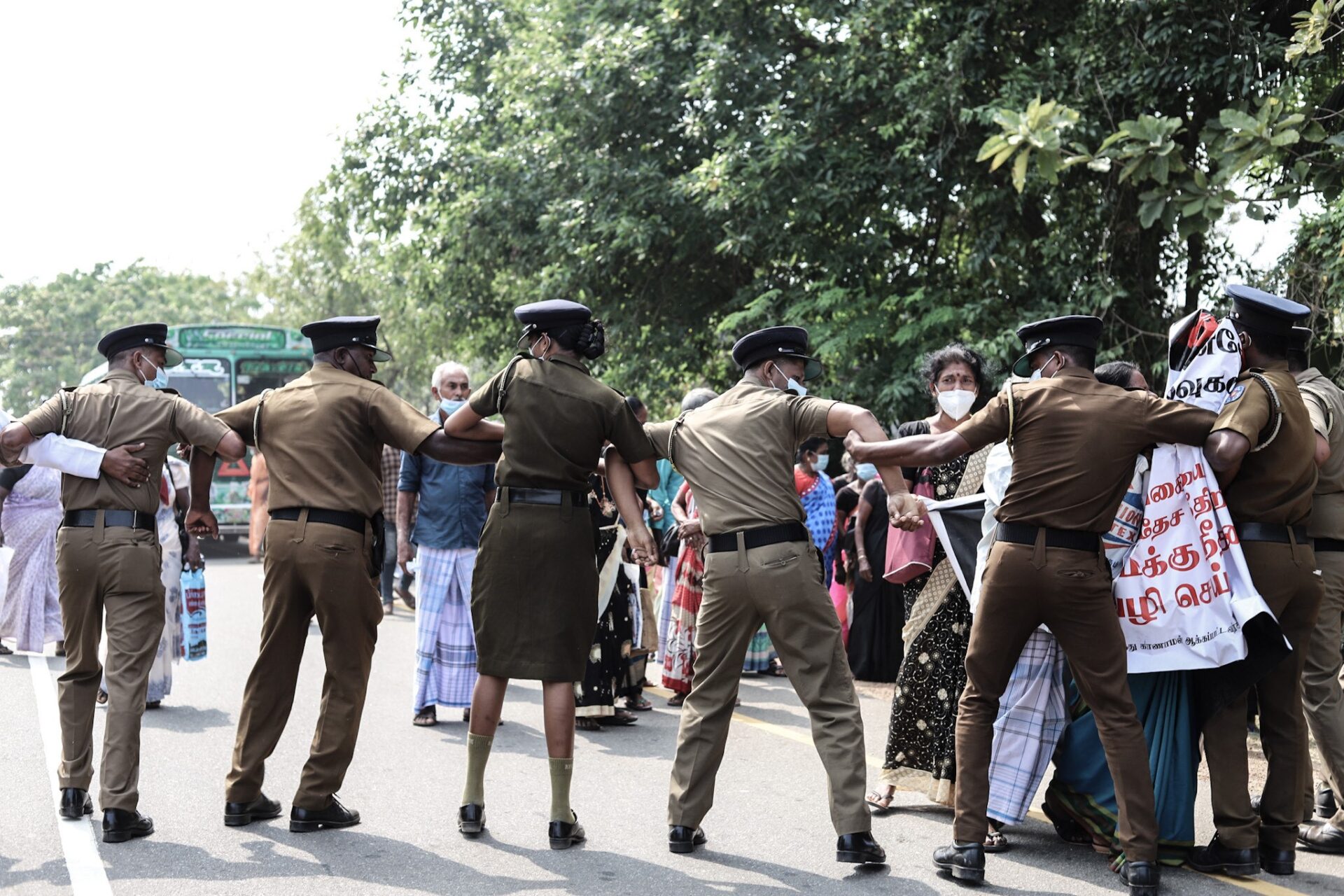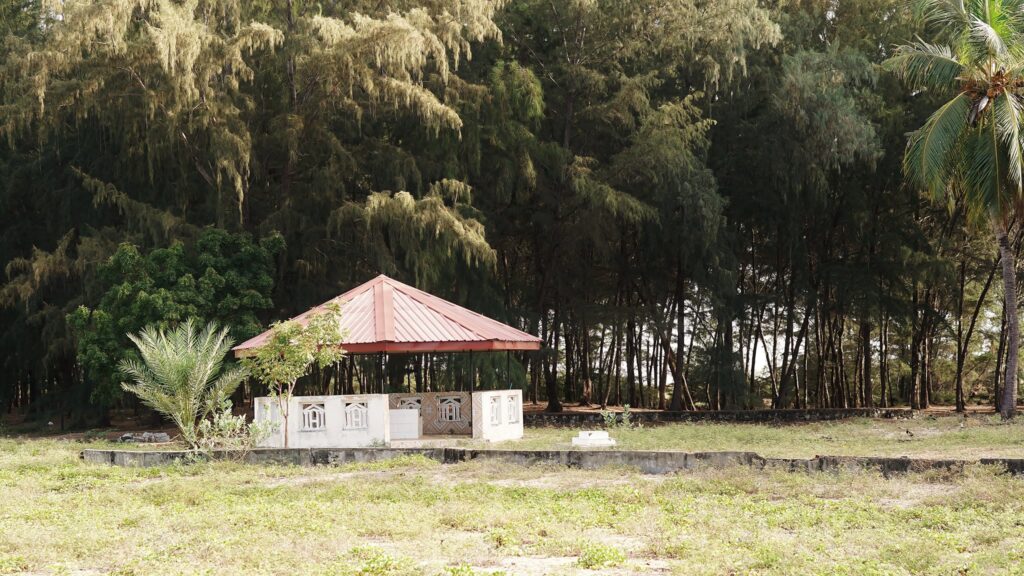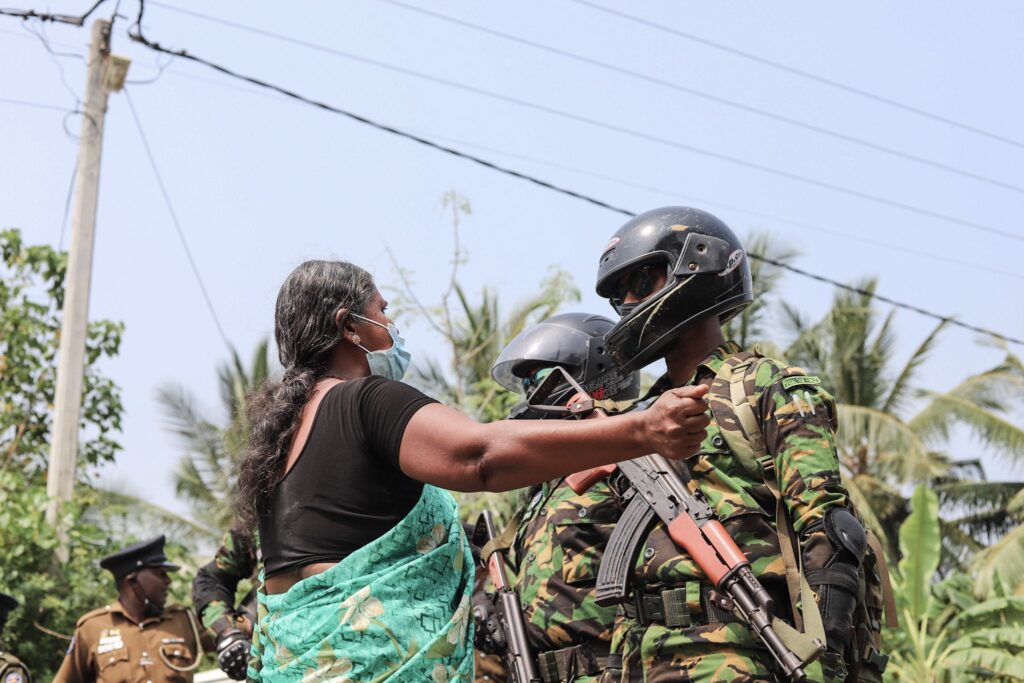by Nillanthan Maha in his blog, March 30, 2022
[translated by Google Translate, with some edits]

Mothers of the Disappeared during Prime Minister’s visit to Jaffna, March 20, 2022
The mothers of the missing opposed Prime Minister Mahinda Rajapaksa’s visit to Jaffna last Sunday. They have been rudely treated by the police. Annai Bhupathi is considered to be the forerunner of Ammuthiya mothers in modern Tamil politics.

Mother Bhupathi Memorial
Thirty-four years ago, at the same time, on March 19, 1988, she began her fast until death. She has a special place in the history of the Eelam War. She was not an armed militant, however, she has the significance of being the first Eelam Tamil woman to fast until her death, ready to sacrifice her life. She was a proper activist who knew the impact of the struggle. The Moddu Amparai Mothers’ Front, of which she was a member, was embroiled in a hunger strike until her death, when justice began with the Indian Peace Keeping Force. However Mother Bhupathi voluntarily continued the struggle till she gave up her life.
Annaipoopathy’s fast is different compared to Dileep’s fast. Thileepan was an armed militant, one who had a lifestyle ready to die. His method of struggle is not non-violence. But he sacrificed his life in the non-violent struggle.
Mother Bhupathi was not an armed militant. But in modern politics she is an unparalleled example of how a housewife can make a bold decision in politics. Dileep struggled for 12 days without food or water. Bhupathi removed the food and drank only water and fought for thirty-one days.
Very few women emerged in Tamil politics even before the armed struggle. Very few women have appeared on stage for the past 12 years in post-armed moderate politics. Standing in front during the intervening armed struggle were many women who emerged as fighters, commanders, officers, speakers, key figures in the negotiating team, but they were all militants in the movements.
Apart from the militants, another group of women personalities quietly joined the struggle. They are the housewives of the sheltered houses. Without these sheltered houses the armed struggle of the Tamil people would not have developed. It is difficult to find in historical records who were the heads of the houses in which they took refuge. The sacrifice and fasting of these mothers became partly literary in short stories about the likes of the mother of Ranjakumar. We have seen women who have given up food or perhaps fasted for their children. To this day we see mothers eating only bread in the hope that their missing child will return. We see mothers fighting on the streets for the past 12 years for their missing children.
The politics of the Eelamites is one that has been built up by things like the fasting and fasting commitment of the unknown mothers. It was against the backdrop of such a tradition of struggle that Mother Bhupathi began her fast until her death. She too was the mother of a sheltered house.
It is one thing to fast until a militant dies. It is another thing for a family member to fast until death. We need to differentiate between the commitment solidity that can exist between the two. This is where the importance of Mother Bhupathi grows. Besides she comes from the eastern center and united the North and the East by her hunger and influence.
In the modern politics of the Tamil people it is still not possible to show a woman who was as self-sacrificing as she was before and until his death.
After Bhupathi, for the last 12 years, mothers have been the main activists in Tamil politics. It was the mothers who came forward to reclaim their lands in Keppapula and the archipelago. Almost all the struggles that have been going on for the last 12 years have been drenched in the tears of Tamil mothers who are searching for their missing relatives.

Mothers of the Disappeared during Prime Minister’s visit to Jaffna, March 20, 2022
When the Prime Minister of the country, Mahinda Rajapaksa, visited Jaffna last Sunday, it was the mothers who protested against him. Mothers are the ones who are insulted and attacked. They are mothers who have been struggling on the streets for more than 12 years in search of their missing relatives. Nearly 80 of them have already died with the disappointment that this world is unjust. Survivors continue to struggle to render justice. They are the readymade fighters in Tamil politics for the last 12 years. They are the foremost fighters for the parties. They are the foremost fighters for the NGOs. They are also frontline fighters for some embassies. These elderly mothers are the first in the eyes of the expatriate Tamil community when it comes to influencing the homeland. They are the ones who come forward with pictures and tears of the missing person in all the struggles. They are the ones who fall to the ground and cry in all the struggles and attract the attention of the media. Despite being separated from the parties and the funding diaspora, it is these mothers who continue to struggle to make ends meet.
For the last 12 years, mothers have been the ones who have been constantly fighting beyond the one-day Tamils, one-day demonstrations, processions and declarations. They are constantly fighting like the farmers who fought against the agrarian bill in New Delhi. The farmers have found a solution. But what these moms have got is one lakh rupees. That is, the value of a missing life is one lakh rupees. [recently offered by the government as compensation]
Recently a friend of mine who is a journalist and owner of an electronic media asked me why people could not soften the struggle of these mothers? That. I told him there are two main reasons. First their struggle originated from the center of the victims. Not all victims can lead with political clarity. Now some of the leaders have gotten there. Yet there are no civic communities or parties or organizations among the Tamil people that can mobilize these mothers and launch a series of struggles. This is the first reason.
The second reason is that there is an accusation that the diaspora parties and parties that later promoted the struggle of these mothers have separated them with their financial aid.
Not only the struggle of these mothers, but also the struggle for land, the struggle for release of political prisoners, the struggle against the Prevention of Terrorism Act, all must be planned from one center. All must be advanced from a center with a clear route map. But there is no such thing as a centrally organized people’s organization, and there is no clear way to picture it. This is the problem.
In such a failed political environment, remembering Mother Bhupathi has become a ritual. But remembering Bhupathi in the true sense of the word is to remind people of the struggle of mothers who have been struggling for the last twelve years. It is to integrate into one center. Do Tamil parties and activists think so?